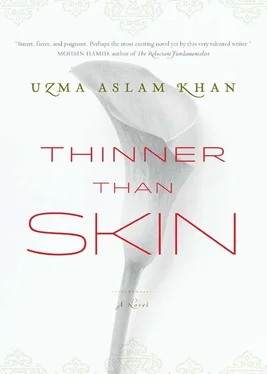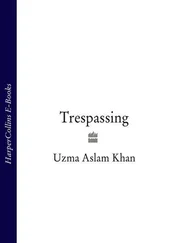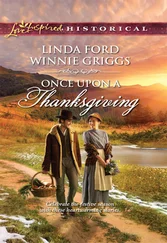“Farrah, you go rest. I’ll take care of him.”
She thanked him, kissed me on the nose, and left the room, I presumed, to curl up on the living room couch with Nature magazine.
He picked up the bowl of soup.
“Don’t you dare.”
Chuckling, he put it back down.
I wiped my chin with the back of my hand. I tilted my head. “Why Farrah?”
He shrugged.
“Farrah Fawcett?”
“My mother knew her at UT Austin. Same sorority. Delta Delta Delta.”
“So that’s why?”
He shrugged.
Did he know, I asked, that Ms. Fawcett’s father was Lebanese, that he’d named his angel Farah, which she later changed to Farrah? Or that Farhana meant the same — joy?
He didn’t seem to care, or maybe he didn’t hear. “They look alike.”
“You mean, the same dark hair, dark eyes, tall frame?”
He chuckled.
“The noses are different.”
“Despite their different noses, yeah, sure.”
I closed my eyes and eventually, he loped away.
I had reason to forget about him the next day.
Farhana woke me with a finger in my navel, just shy of the bandages, thus announcing the beginning of a long spell of bedridden bliss, full with feasting and being doted upon. She tried several of my mother’s recipes — the chicken karhai turned out fabulous — and whipped up salads with flowers. It was a time of cardamom, artichokes, and art. She gifted me with photography books I couldn’t afford, including a collector’s edition of Elizabeth Carmel’s Brilliant Waters . That was the day my bandages came off. Carmel’s waters were the texture of skin, her stones so organic my fingers hovered at my gut, lightly memorizing the cut, reassured in the knowledge that my insides were safe.
“Thanks for cooking,” I told her from the bed. “I know it’s not your favorite thing to do.”
“I’m just very picky who I cook for.”
I could have lain there for weeks.
As I recovered, we discussed details of our trip. Karachi, Islamabad, Gilgit, Hunza. She had maps, one of which showed the way to Ultar Glacier, and beyond, to Batura Glacier. With a gaiety that made her glow, she spoke of the work she’d do, called it reading the ice. My eye drifted to a different point on a map. So you read the ice? I mused, not thinking to ask if she’d keep reading it, when it formed between us. We were on a pre-honeymoon, and, unlike the first time she described what she’d do in Pakistan, now I was interested. I learned something about myself in those bedridden days, something I hoped I’d never need to admit. I adored her adoration. I wanted her to feed me, tuck me into bed, swaddle me like a child. I did want to return to my solitary nocturnal habit, it was true, but this hiatus, during which I was entirely in her keep, was delicious. I wanted to be absolutely spoiled by her. So I leafed through her maps, and grew intrigued. “Glaciers might have been growing in north Pakistan for three decades,” she said, sensing what a brilliant audience her patient made, “in some of the most isolated places on earth. I want to start an archive of geochemical and isotopic data.” I grew to love the language of glaciers. They galloped and groaned, cracked and crept. They were foul-mouthed. They were serene. Twice more my eye fell on the point on a map we were never meant to see as anything other than a point: the shape of a buffalo in profile, with Kaghan Valley his ear, cocked, listening to voices at his back, while facing west. Though I remembered climbing up the buffalo ear with Irfan and his soon-to-be wife (and soon-to-be dead wife), I said none of this to Farhana as we pored over the maps. Ours was to be a different route. Never once during this time did she mention that Wes would be coming with us. Who and where . The elementals of a shared voyage. I thought I knew who; she thought she knew where.
On the day of a final check at the hospital, we took Matthew’s car. The doctor declared the cut had healed “beautifully” and, to celebrate (a little wistfully on my part), we stayed out late, browsing in bookshops, enjoying a dinner of mussels and wine at the Cliff House. Then we got on the Great Highway, the stretch of coastal road that always transported me to Karachi, the one I thought I’d been heading for when I’d met my attacker. About a kilometer from Balboa Street, we saw something white in the middle of the road. A barn owl, the heart-shaped face luminous. She said an owl was a symbol of so many wonders, evil and wise, and ours was wise. I reconsidered her father’s hint— at least she isn’t married —and found it did not scare me as much, at least not till she began to cry, saying she wanted me to look so peaceful when I died.
Back in my apartment, she presented me with a gift. A collection of prints by Robert Frank. The pages had been marked — at first I mistook it for secondhand — with phrases underlined, such as, he mapped the void between public and private memory and he chronicled the racism infusing the collective consciousness of his generation . I flipped to a series of shots of his wife and child inside a car, taken from outside. There was an expression on his wife’s face so complex I couldn’t pull myself away. Sometimes I saw resignation, other times, I saw judgment. Sometimes the car was her cage, other times, a comfort, as much as she was cage and comfort to the child. But I barely noticed the child. It was the layers of entrapment in her gaze that arrested me. The quiet confrontation between woman, child, and voyeur.
Farhana skipped a few pages ahead, and began reading aloud. “He needed to rid himself of the burden of the past to live more immediately in the present.”
There is nothing wrong with that, I wanted to say.
She was watching me. “What are you most burdened by?”
I had made the mistake once before of answering her when she was in this mood. I said, “I only know what isn’t a burden. You, Farhana. You are my joy.”
“My needs can be a burden, though,” she laughed. “If you deny it your nose will grow.”
“I understand your needs.”
She pinched my nose, laughing. “I love you. And a long nose suits you.”
“Can I photograph you — now? Your legs?”
“So much for stealing the soul!”
“Just your legs.”
When she looked up she wore the same look as on that night she undressed for me, only this time, I was ready.
I shot a series of black and white prints as she lay on her side, legs in dark sheets, muscles bright as planets. Hers were steep legs built by steepness. Mountain legs. Calves tapering tidily to the ankles. Stocky yet slanting. Her sartorius cut a ribbony dialogue on her flesh; it was the slope of the calla lily again — I saw it once more in that moment — only now the braid was a muscle snaking along her taut thigh. They were legs that defined themselves as much from the front as the side. We created our own version of another book she’d found this week, as a joke, a square, slender book that made me think of children’s hands. The Male and Female Figure in Motion . It featured a naked man and woman engaged in various “everyday” activities to show off their anatomies, including walking upstairs with a bucket in each hand, throwing hankies over shoulders, and rolling wheels uphill, activities that were hardly everyday. The shots were wide-angle, the figures so remote they were less in motion than in deep freeze. It could have been a children’s book; the gingerbread man doing laundry, Goldilocks plumping pillows.
For our version, over our shoulders, instead of hankies, we threw dirty underwear, and walked “uphill” to bed. Unlike the wholesome originals, our shots filled the frame. When Farhana bent, I shot her ass; when I torqued in surprise, she shot my penis. We opened three bottles of wine, drinking two and wasting one. By evening, after making love once and trying again without success, we collapsed, naked and in love.
Читать дальше












